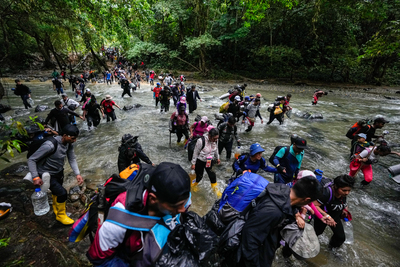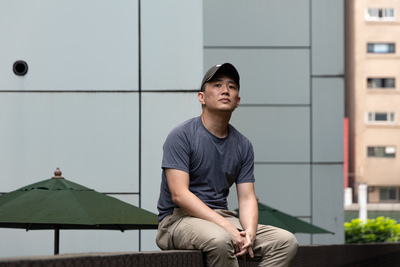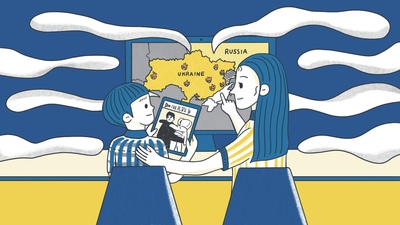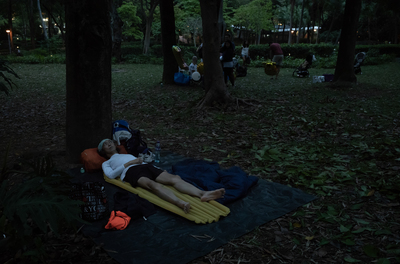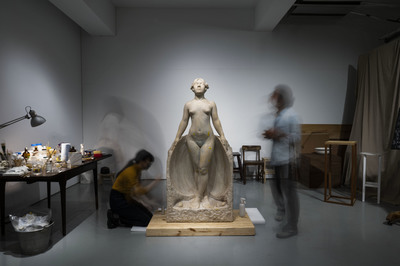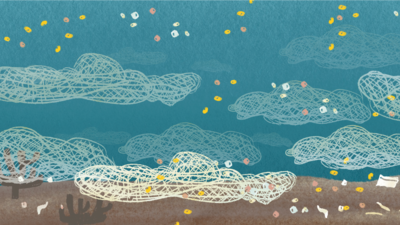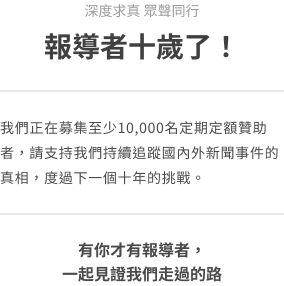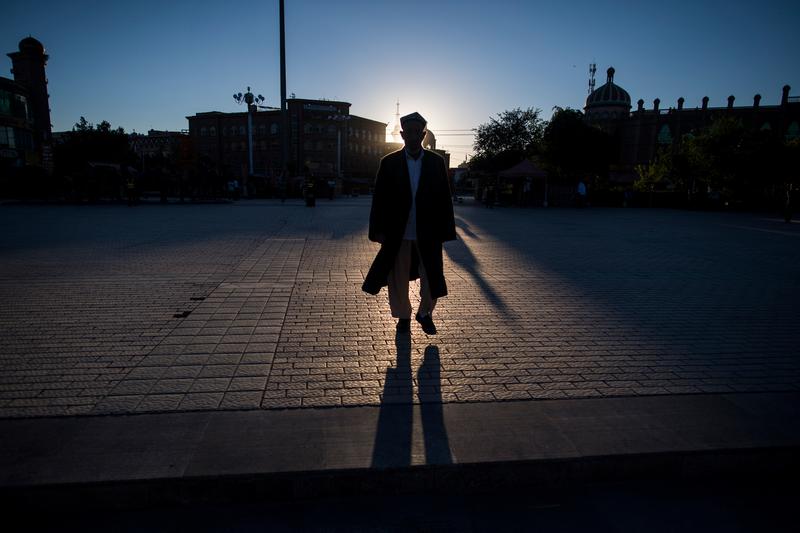
Uyghur vendors were once a staple of cities all across China, now they’ve all but disappeared, says writer Fan Zhijie.
There is a joke that goes: when the first Chinese astronaut lands on the Moon, he’ll be astonished to find Uyghurs there selling lamb skewers. This is a testament to the entrepreneurial spirit of the Uyghurs, and their ubiquity throughout China and beyond.
It is now virtually impossible to find authentic Xinjiang lamb skewers in the city where I live. Thinking back, this has been the situation for the past two years, even when I travel and consult my sources.
The world's attention was recently drawn to the re-education camps in Xinjiang, but almost all the discussion has overlooked one premise: if the Uyghurs still have freedom of movement within China's borders, and the freedom to travel abroad, even the harshest concentration camps would not be able to eliminate them.
Suffice it to say, the Uyghurs have all bust lost their freedom of movement. But the disappearance of lamb skewer stalls is not just due to first-tier cities like Beijing expelling their "low-end populations” (although their policies most certainly affect economically vulnerable ethnic minorities), it’s the various local governments imposing strict regulations on where Uyghurs, Kazakhs, and other ethnic minorities can reside.
Over the past year or more, the check-in procedures at hotels have tightened considerably. Other than checking identification documents, every guest also has to be verified by a facial recognition system. Even if a Uyghur individual is carrying valid identification documents, he will still be instructed to head to a "designated accommodation". If the hotel staff accidentally checks in a Uyghur guest, the police will swiftly appear at the lobby and request the staff go to the police station to report on the Uyghur guest's daily movements.
What if a Uyghur decides to rent a room and stay for a longer duration? The landlord would suddenly inform the Uyghur renter that the residence will need to be used for other purposes; he is willing to pay a decent sum to compensate for the early termination, but the renter has to move out immediately. The landlord does not actually have any other use for the room, of course, they just receive requests from the relevant authorities to evict renters of particular ethnic minorities. In the future, in order to avoid being on the hook for such compensation, the landlord simply will not rent to ethnic minorities in the first place.
The above-mentioned scenarios are currently not corroborated by any official "red letterhead" directive, but my friends have encountered such situations.
This is why Uyghurs in their iconic white caps selling lamb skewers or sweet walnut cakes have been absent from China's cities for some time now.
When I went to Beijing with a friend to watch the 2008 Olympics, I received a text message from the chain hotel I was staying at. The message emphasized that people from Xinjiang and Tibet were not welcome.
On this occasion, my friend criticized the hotel for being so politically incorrect, but China’s ethnic Han majority are largely indifferent to the restrictions on Uyghurs' freedom of movement, and some even support such measures.
Most cities in China are almost exclusively the realm of Han Chinese. When they see an Uyghur with their different appearance, clothing, and speech, they normally see the Uyghurs as talented singers and dancers, or as fierce and audacious. These are of course stereotypes, but such perceptions are not completely off the mark.
A classmate of mine once said that her female Uyghur college classmate was always reluctant to attend hometown gatherings at their school because she would get bullied by the Uyghur boys. After such gatherings, she would return to her room with her eyes red from crying.
For a very long time, many cities in China had Uyghur pickpocket gangs. Han Chinese said that these Uyghurs carried knives wherever they went, stealing what they could and robbing what they could not steal. Fearing for their safety, most people did not dare to intervene when a theft was being committed by a Xinjiang native.
I recall getting pick-pocketed by a Uyghur girl while shopping with my girlfriend. I caught the thief in the act, but she and her peers just laughed it off; my girlfriend threw a tantrum because she thought I looked weak.
Han Chinese often blamed police incompetence for the deterioration of public order and the deepening climate of fear in the cities. The most iconic example was the 2012 "cut cake scam" (cut cake, also known as maren candy, is a Uyghur delicacy).
Before that time, rumours circulated among ethnic Han Chinese about Uyghurs' dishonest business practices. For instance, it was said that an Uyghur cut cake seller would initially agree to a certain price for 50 grams of cake, but later insist that the price was actually for one gram only. If the customer refused to pay, a group of Uyghurs would supposedly resort to violent means to compel payment.
On December 3rd, 2012, the public security agency of Yueyang City, Hunan Province, announced on Weibo, "When a villager, Mr Ling, was buying Xinjiang walnut cake (i.e. cut cake) a misunderstanding occurred due to the language barrier, and an argument between the two parties escalated into a group brawl.”
Mr Ling eventually had to pay damages totaling 152,000 Chinese yuan. During that era, when people still believed in the power of crowdsourced citizen journalism, netizens saw the official announcement as proof that the "cut cake scam" really existed.
Whatever the reality was, you can no longer savour authentic Urumqi lamb skewers, or raise your suspicions about the Uyghurs selling cut cake — both have disappeared from the daily lives of Han Chinese.
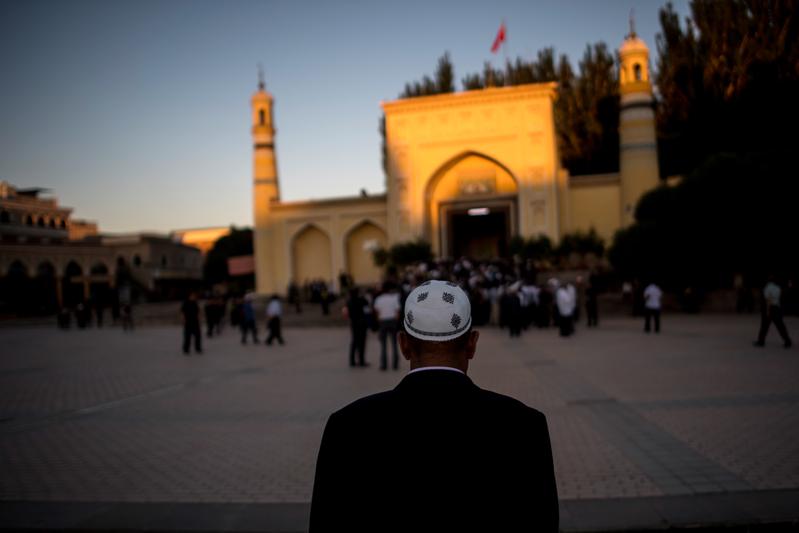
With no other place to go, and no permission to travel overseas, the Uyghurs scattered across China have but one choice left: return to Xinjiang.
With the benefit of hindsight, the Chinese government could have planned this more meticulously. They could have waited for all the Uyghurs to return before putting their "collective management" into action - or should we call it "complete elimination"?
The government’s top decision-making body, the Chinese Communist Party's (CCP) Central Committee, is made up of 25 members, and features the party secretaries of the five most important territories — Beijing, Tianjin, Shanghai, Chongqing, and Guangdong. But beginning in 2002 at the 16th Party Congress, the party secretary of the Xinjiang Uyghur Autonomous Region joined alongside them.
In August 2016, Xinjiang’s party secretary Zhang Chunxian (張春賢) stepped aside, making way for Chen Quanguo (陳全國), who previously administered Tibet.
Georgetown University professor James A. Millward had this to say about Chen:
“Chen Quanguo brought his network of inspection checkpoints, security posts, armoured vehicles and constant patrolling to Xinjiang. This system was perfected during his term in Tibet, and the CCP believes he would be able to pacify a stubborn populace dissatisfied with party rule. In his first year administering Xinjiang, Chen has already hired upwards of ten thousand new security personnel.”
I visited the province a few years ago, when Zhang Chunxian was still Xinjiang’s party secretary. When the bus entered Urumqi, everyone had to disembark for a security check and to verify their identities; the queue for inspection was very long. The attitude towards Han Chinese was markedly more relaxed, and they passed through much more quickly than the ethnic minorities.
A Han Chinese county-level manager recounted an “interesting” incident: he once travelled with a municipal commissioner from southern Xinjiang. At the airport security inspection, the Han Chinese officials were quickly waved through, but the commissioners who were ethnic minorities were thoroughly inspected. “Even though he did not say a thing, he was definitely unhappy about it.”
Looking back, these security measures now seem like child’s play. Walking through the streets of Urumqi today, there are policemen checking your identification every few hundred metres, and one would be hard-pressed to go anywhere without valid identification.
Kitchen knives bought by Uyghurs have to be tagged with QR codes containing their personal information; handphones must have official spyware software installed; and the streets are full of security cameras. Simply put, there is no escaping the authorities’ notice. These measures can be verified through overseas reporting, domestic news and local hearsay.
This is the work of Chen Quanguo, and it’s the reason why some have called on the United States government to impose sanctions on him. Chen may have even reached a level of notoriety equal to Wang Zhen (王震), a pioneering general in the CCP who occupied the region in 1950. He was sometimes known as “Bearded Wang”, a nickname given to him by Mao Zedong (毛澤東).
In the 80’s and 90’s, Wang was one of the eight most senior cadres in the Party, alongside Deng Xiaoping (鄧小平). During the Tiananmen Square Incident, he was a hardliner who advocated for military force to suppress the protests.
During Wang’s rule over Xinjiang, his approach was equally heavy-handed, leading locals to invoke “Bearded Wang” when they want to frighten their disobedient children.
A friend of mine born in Urumqi once wistfully said, “Bearded Wang could demand executions for even the slightest provocation, so the Uyghurs had to lay low.” Even today, there are people who believe that Wang Zhen’s heavy-handed policies should be continued. Many now see the shadow of “Bearded Wang” in party secretary Chen Quanguo.
Chen alone, however, cannot alter the course of an entire country. He is merely a pawn engaged at the front-lines of Xinjiang, who now has to deal with the formerly scattered Uyghurs, all herded back to their homeland.
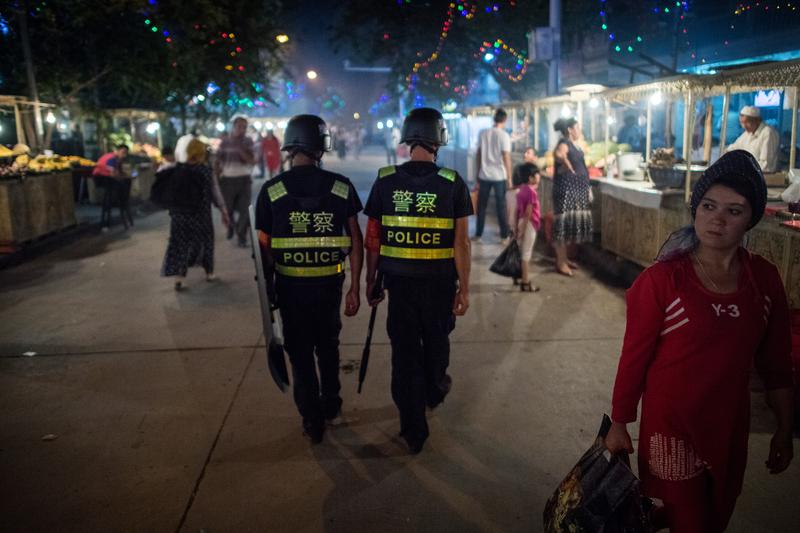
When Xinjiang was annexed by China during the Qing Dynasty, Emperor Qianlong (乾隆) named Urumqi “Dihua”, an abbreviation for the Chinese phrase meaning “correction and enlightenment”. Although Xinjiang broke free from centralized government control for a time, the warlords controlling the territory, like Sheng Shicai (盛世才), were not Uyghurs, but ethnic Han or ethnic Hui (another Muslim minority group in China).
Territorial expansion was probably the CCP’s foremost concern when they initially claimed Xinjiang (the province accounts for one-sixth of the country’s landmass), since natural resource considerations had not emerged yet. The Tarim oil fields were only explored and developed in the late 1980s, while the Karamay oil fields were discovered in 1955.
Regardless of motive, resettling ethnic Han in Xinjiang to stabilize the border region has always been government policy. Today, ethnic Han comprise the majority in northern Xinjiang and Uyghur people only make up around 12 percent of the population.
I once asked a few people whether Xinjiang has a local Chinese dialect and they all told me there wasn’t one, because ethnic Han in Xinjiang originate from various parts of China. At most, there are only a few local colloquialisms: for instance, when giving directions, locals may alter how long they stretch the word “straight” to emphasize how far one should walk.
In recent years, Han Chinese have insisted that they contributed to Xinjiang’s development (I personally think that the roads in the province are quite well-maintained), but many Uyghurs think that however much the Han Chinese have contributed, they have plundered even more. The two ethnic groups hold irreconcilable views and are unable to reach a common understanding.
To be sure, there will be some members of every minority group who unwaveringly support the CCP. From our outsider’s perspective, government officials in northern Xinjiang get along well regardless of ethnicity. Someone once asked an Uyghur official whether all Uyghurs are Muslim, and the official replied, “I have been serving in the military since my teenage years, and have been loyal to the party for over three decades. How can I believe in that?”
There are ethnic Han officials, however, who privately say that despite the appearance of harmony, ethnic barriers still exist, and it is not uncommon for Uyghur party members and cadres to practice their faith in private.
A psychologist in a local hospital revealed that quite a few Uyghur party members and cadres have come for consultations because they “feel stressed that their compatriots view them as ‘race traitors’”, and even fear getting hurt by reprisals.
For a long time, the Chinese government adopted a carrot-and-stick approach towards ethnic minorities. On one hand, although everyone assumes that their will be differences between ethnicities, Han Chinese have never been completely at ease with minority groups in China, and have always been on their guard with Tibetans and Uyghurs. On the other hand, to proclaim the unity of the nation’s 56 ethnic groups, minority peoples are given preference in the gaokao national examination — China’s standardized college testing — and in other policy areas.
Furthermore, to minimize the possibility of inflaming ethnic and religious tensions, the government is often more lenient in its enforcement of theft and other crimes committed by minority ethnic groups, incurring the displeasure of Han Chinese society. Even in the past four to five years, the government’s “soft” approach towards minority ethnic groups was still evident.
On May 26th 2014, Xi Jinping announced at a Politburo meeting his intention to provide free senior high school education to students in southern Xinjiang (thus providing free education for 12 years). Meanwhile, in the rest of China (with the exception of Tibet) even the most prosperous regions only receive 9 years of state-funded education.
These policies do not address the Uyghurs’ pain points. Uyghur families often have more children, and cannot afford to keep them in school for 12 years even if education is state-funded.
Even in schools, where the stated objective is to promote ethnic integration, it is easy to notice how Han and Uyghur children attend the same classes in the same classrooms, but form separate groups that do not interact with each other. For example, the passing score is 60 points for Han students, but for Uyghur students, a passing score is only 30 points. Han students find this situation unfair, while Uyghur students are disgruntled about the discrimination they face.
The government’s family planning policy is also worthy of note, even before the one-child policy was loosened nationwide to allow families to have 2 children, Uyghur families were still allowed to have 3 children.
Uyghur families often had more children than they were allowed. The punishment for exceeding the birth quotas was to bar the “surplus” children from being registered and to not process their identification documents, but this only created more chaos and further hindered the government from controlling the population. When officials conduct spot checks to verify population figures, the undocumented children simply used their siblings’ identification documents, and the Han officials are usually unable to tell the difference.
Chen Quanguo’s predecessors, Wang Lequan (王樂泉) and Zhang Chunxian, did not implement as many extreme measures in Xinjiang.
Wang administered Xinjiang from 1994 to 2010. A Source close to Wang once told me that he was good person, and generously received guests with meals and drinks.
The July 2009 Urumqi riots that resulted in 197 deaths happened under Wang’s watch.
Before the riots, a huge brawl had erupted between Han and Uyghurs in Shaoguan city, Guangdong province. Two Uyghurs lost their lives in the skirmish, sparking off protests by Uyghurs in Urumqi.
Initially, the protests did not draw sufficient attention from the authorities, and a rumour spread among government officials that Wang was “drinking at his hometown in Shandong when the Urumqi riots broke out.” These officials believe that the killings and reprisals between Hans and Uyghurs, which lead to the death of nearly two hundred people, gave rise to a blood feud between the two ethnic groups, and that Wang cannot evade responsibility for the incident.
A Han official fluent in the Uyghur language told me that he was born in northern Xinjiang and grew up with Uyghur children; for a long time, it was very normal for Hans and Uyghurs to go to each other’s houses for meals, and Muslims would not particularly mind that Han dishes were not “halal” enough.
The Urumqi riots changed everything. Hans and Uyghurs still greet each other, but there is a much stronger sense of ethnic self-identification, and it is now unimaginable for them to have meals in each other’s homes.
In 2010, Zhang Chunxian was transferred from Hunan to Xinjiang. When I went to Xinjiang, the most common complaint about his administration was the “grassroots” policy he introduced in February 2014. He split 200,000 cadres into three batches, and each batch took turns being stationed for a year at the grassroots-level in order to be thoroughly immersed in the local community.
Middle and lower-level officials had many criticisms of this policy which they believed was aimed at appeasing the central government. For instance, the intention of this policy was to allow cadres to work closely with Uyghur communities and resolve their differences, but the Han Chinese cadres could not speak Uyghur with the locals, rendering the policy useless. Additional security even had to be dispatched to protect vulnerable female cadres.
In retrospect, neither Wang Lequan’s indifference nor Zhang Chunxian’s superficial policies could resolve the ethnic and religious tensions in Xinjiang.
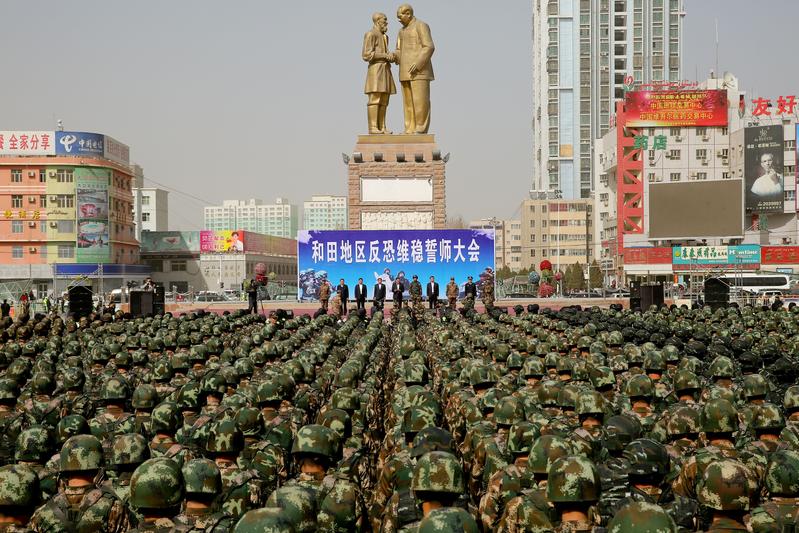
It can be said that the extension of state-funded education to 12 years was the last significant policy under the government’s “soft” approach.
A month before that policy was announced, Xi Jinping made his first and only trip to Xinjiang in his capacity of head of state. While there, he inspected, investigated and immersed himself in the Uyghurs’ Kashgar region.
On the last day, he received a model workers’ representative in Urumqi. This is the same day an attack occurred at Urumqi’s south railway station that led to three dead and 79 injured. Officials said the attack was carried out by a terrorist group, the East Turkestan Islamic Movement.
After that incident, I went to the hotel that Xi Jinping was staying at in Kashgar. It was completely surrounded by metal fencing, with an armed military guard stationed around the clock at the entrance. There were also military command centres from several cities and provinces within the fenced compound, to guarantee the officials’ safety.
It was common to find the entrances of government offices equipped with metal anti-vehicle barriers, prepared for the possibility of armed conflict.
A Han doctor once told me that they sometimes make the rounds in rural Uyghur villages, “but at those times we would be ashamed; we treat their illnesses, and the villages welcomed us with song and dance, but following right behind us were the armed military police.”
The attack at the train station was without doubt, a chilling incident. Happening so shortly after the announcement for 12 years of free education, we can only guess whether this was the turning point that led China’s leadership to violently suppress other ethnicities under a policy of state terrorism.
The Chinese government blames all terrorist incidents on a combination of “separatism, extremism and terrorism”. A local official overseeing ethnic and religious matters privately expressed that although the Tibetan independence movement has some international support, its capacity is limited, and the Xinjiang independence movement is a much graver threat.
He even revealed that Xinjiang separatists once assaulted a secret military base within the province in the 1990s, and none of the 200-plus soldiers of the People’s Liberation Army survived. To date the government has not publicly acknowledged this.
Although the number of terrorist incidents and casualty counts for the past two years has not been disclosed, are there really as many terrorist incidents in Xinjiang as the government claims?
Not necessarily. A local official raised an example, recalling a confrontation that led to many deaths. It started as a parking argument but escalated when each party called on others for help. Because one of the parties in the initial argument was Uyghur, local officials reported it as a terrorist incident to burnish their political track record.
Who can sleep peacefully with the knowledge of re-education camps?
The Chinese edition of the New York Times recently reported:
“Following Xi Jinping’s visit to Xinjiang in 2015, Beijing started to build ‘camp compounds’ in order to warn Muslim minorities about the dangers of religious extremism and ethnic separatism. Official speeches and reports show that the scale of these internment camps was relatively small, and many detainees were only detained for a few days or weeks”.
The news we receive in China basically corresponds with the article; for instance, the “occupancy” of the camps were quite low when they were established, but they are now filled to the brim. As for whether millions are being detained in these camps, only the Chinese government knows the actual figures, and the outside world cannot accurately determine the exact numbers.
The Chinese government has only announced that the “re-education centres” are meant to provide job training and legal education, with the aim of “treating illness and saving lives”. On October 9, they also hastily altered local regulations, “legalizing” the camps.
On September 28, during a dialogue with former US Secretary of the Treasury Robert Rubin, Chinese Foreign Minister Wang Yi (王毅) said, “Xinjiang has a population of 20 million; they greatly approve of the government’s methods, because it makes them feel safe, and lets them sleep peacefully at night.”
Wang said that fundamentalist groups and ISIS are infiltrating Xinjiang, recruiting unemployed youth into their ranks with violent videos and making Xinjiang a very unsafe place; to protect the lives and property of the people of Xinjiang, the Chinese government took action; as a result, there have been no terrorist incidents in the past one to two years in Xinjiang. Moreover, the government has also announced that, due to the stable situation, tourism revenues for Xinjiang this year are quite sizeable.
According to scholar Samuel Huntington, ethnic and religious contradictions are a manifestation of the “clash of civilizations”. From the Chinese government’s perspective, if they have to choose between maintaining stability and not violating human rights, they will not hesitate to opt for the former – unfortunately, this is one way in which the Chinese government’s ideology clashes with global mainstream theories of governance.
But if someone has not implemented or even planned a crime, does the state have the authority to restrict their personal freedoms?
On September 27, Urumqi’s tourism ministry suddenly announced that, due to“adjustments in the tourist rail route map”, ticket sales for rail travel in and out of Xinjiang will cease after October 22. Foreign media speculated that the trains will be secretly diverted for the re-education camps.
There were also stories from the start of October that there are large buses with black blinds pulled across the windows headed to Urumqi, or to Gansu or the surrounding provinces.
Nobody knows when these Uyghurs will return to their hometowns.
(To read the Chinese version of this article, please click: 樊志傑/被消失的新疆──我在中國見證的日常 )
深度求真 眾聲同行
獨立的精神,是自由思想的條件。獨立的媒體,才能守護公共領域,讓自由的討論和真相浮現。
在艱困的媒體環境,《報導者》堅持以非營利組織的模式投入公共領域的調查與深度報導。我們透過讀者的贊助支持來營運,不仰賴商業廣告置入,在獨立自主的前提下,穿梭在各項重要公共議題中。
今年是《報導者》成立十週年,請支持我們持續追蹤國內外新聞事件的真相,度過下一個十年的挑戰。

